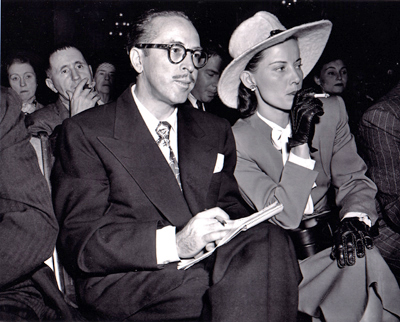From its inception in 1938 until it was dissolved in 1975, the House Un-American Activities Committee (HUAC) took a prominent role in the investigation of communist activity in the United States. Although its supporters claim that this committee of the U.S. House of Representatives performed an important function, its critics contend that its abuse of power trampled important First Amendment rights, such as freedom of expression and freedom of association.
HUAC investigated Communist Party infiltration
HUAC’s predecessor, the McCormack-Dickstein committee, named for its chair and vice chair, Reps. John W. McCormack, D-Mass., and Samuel Dickstein, D-N.Y., had been formed in 1934 to investigate Nazi propaganda. In 1938 it became the House Un-American Activities Committee, and its first chair was Rep. Martin Dies Jr., D-Texas, who headed it until 1944. Under Dies, HUAC soon turned its attention toward investigating Communist Party infiltration and involvement in New Deal agencies, such as the Works Progress Administration. In 1939 it held hearings to investigate the WPA’s Federal Theatre Project, inquiring into whether any of its members or those who worked with it were communists.
HUAC investigations led to Hollywood blacklists
In 1946 HUAC became a permanent House committee, charged with investigating subversion in the United States. In 1947 and 1951 it investigated alleged Communist Party influence in Hollywood and the motion picture industry. As a result of these and subsequent hearings, nearly 300 actors and others employed in the movie industry were blacklisted or prevented from working. Many of those called to testify before HUAC pleaded the Fifth Amendment and refused to testify. Such refusal was often taken as tantamount to guilt, and many individuals were cited for contempt of Congress. Others did testify. Among them was noted film director Elia Kazan, who named numerous people who he believed were communist sympathizers, and they too were blacklisted.
One of HUAC’s most famous hearings took place in 1948, when Whittaker Chambers, a former member of the Communist Party, testified before the committee. Chambers’ testimony eventually led to the conviction of Alger Hiss, a State Department employee suspected of being a communist, for perjury.
HUAC led to targeted investigations by McCarthy, chilling of First Amendment freedoms
HUAC fed off the hysteria of the cold war and anti-communism, paving the way for Sen. Joseph McCarthy, R-Wis., to begin hearings in the Senate in 1953. Between HUAC and the McCarthy hearings, Congress held broad, roving investigations into the political activity of many Americans suspected of being communists or communist sympathizers. The hearings also investigated many who did not hold communist views, creating a climate of political intimidation that came to be called “red baiting” or McCarthyism. The impact of these hearings was to ruin the careers of many individuals and to foster a political paranoia toward anyone suspected of holding contrary political views or of joining suspected political organizations.
HUAC became unpopular during Vietnam War investigation
The end of HUAC came when it began to investigate opposition to the Vietnam War. Its 1967 and 1968 hearings investigating anti-war activists Abbie Hoffman and Jerry Rubin, both of whom attended the hearings at various times wearing a Santa Claus or a Revolutionary War patriot outfit, contributed to the rising unpopularity of HUAC. In 1969 its name was changed to the Internal Security Committee, and in 1975 it was abolished. During HUAC’s tenure, more than 3,000 individuals testified before it. Its investigations were the subject of several Supreme Court decisions that sought to define the scope of the constitutional power Congress had to hold hearings.
This article was originally published in 2009. David Schultz is a professor in the Hamline University Departments of Political Science and Legal Studies, and a visiting professor of law at the University of Minnesota. He is a three-time Fulbright scholar and author/editor of more than 35 books and 200 articles, including several encyclopedias on the U.S. Constitution, the Supreme Court, and money, politics, and the First Amendment.

